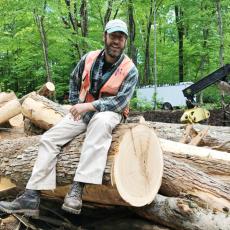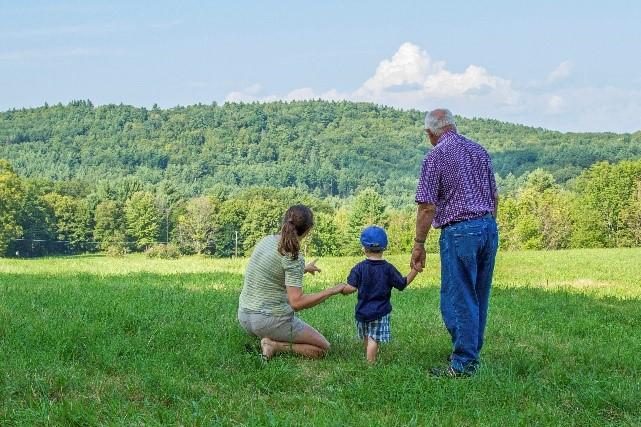In Our Spotlight
Conserving Massachusetts’ Family Forests
Like Robert Frost’s character in “Stopping by the Woods on a Snowy Evening,” Paul Catanzaro, extension associate professor and state extension forester, has been captivated by the forest most of his life. He recalls years of snowshoeing and canoeing through Algonquin Provincial Park in Ontario, Canada on church youth group trips, which cultivated his passion for forests. These early experiences evolved into his life’s work. He is rightfully viewed as one of the state’s most ardent protectors of forests. Catanzaro has been with the University of Massachusetts Amherst’s Department of Environmental Conservation since 2004.
Balance and Integration: Extension, Teaching and Research
Catanzaro’s undergraduate major was cultural anthropology, the study of people. But he was ultimately drawn back to his passion for forestry. Since 70% of Massachusetts’ forests are family forests, owned by families and individuals, he understands that the confluence of these two interests, understanding people and understanding trees, is critical to the conservation of New England’s forests.
Catanzaro has what’s known as an Extension faculty appointment, splitting his time between extension, teaching and research. The major thrust of his work (50% of his appointment) is extension, where he focuses on outreach efforts on the critical issues of land conversion and climate change. Catanzaro conducts research as an integrated part of his extension efforts. He is co-director of the Family Forest Research Center, a collaboration between UMass Amherst and the USDA Forest Service. Paul also teaches undergraduate and graduate students in the Society of American Foresters (SAF) accredited forestry program (30% of his appointment). In fact, Paul started a class in land protection, one of the first of its kind in the country. In a conversation with him it becomes immediately apparent that each aspect of his work is completely intertwined. Extension, research, and teaching supporting and informing one another in the true spirit of UMass’ land grant mission.
The Future of our Forested Landscapes
Catanzaro says that Massachusetts landowners form an aging demographic. Their average age is now mid-60’s. In fact, it’s estimated that we are in the midst of the largest inter-generational land transfer our country has ever seen. Over the next decade, these landowners will decide whether to keep their land as forest, convert it to other uses (e.g., houses), parcelize it into smaller properties, or permanently conserve it. These decisions are shaping what that landscape looks like forever and the public benefits they provide. To help inform these decisions, Catanzaro has led the development of a conservation-based estate planning initiative, which includes outreach programs to landowners, publications such as Protecting Your Legacy, the recent Protecting Your Legacy webinar series and online resources. Several of these resources have been adopted by states across the country. The work of this initiative is a collaboration with the Mount Grace Land Conservation Trust and is funded by the Mass. Department of Conservation and Recreation.
Climate Change, Forest Carbon, and Resiliency Move to Center Stage
Increasingly, Catanzaro helps develop forest management strategies around issues related to climate change, particularly in regard to resiliency and carbon. Two recent publications, Forest Carbon and Forest Resiliency both form the basis for workshops, webinars and outreach. Topics covered include effects of climate change and the important role forests play in mitigating it (as they sequester carbon out of the air and then store it). As people look for solutions to climate change, Catanzaro asserts that forests are being increasingly recognized as an essential natural solution to climate change.
When asked what is the one thing we can do to help with issues of climate change, Catanzaro says, “Keep forests as forests! Let them do the great work they do, naturally.”
Keystone Cooperators
Research and experience show that when landowners are making decisions about their land, family and friends invariably rise to the top as key resources. The Keystone Project works to harness the power of social networks by training those that landowners naturally turn to for information. A ‘keystone’ species is one with a disproportionate influence on its environment. Likewise, the Keystone Project trains those in a position to make forest conservation decisions and, more importantly, influence the forest conservation decisions of others. Participants may own forestland, be involved in the care and stewardship of a property (e.g., town land, land trust land), or be an active community leader (e.g., conservation commission, open space committee, planning board, select board). These are individuals who are respected in their communities and seen by others as real resources. They are brought to Harvard Forest in Petersham, Mass. for a three-day retreat where they are provided an intensive short course in forest ecology, wildlife and land protection. Afterwards, these folks—now known as Keystone Cooperators – return to their communities, where the real work begins. In exchange for the training they have received, they agree to use that knowledge to help community members make informed decisions about the stewardship and conservation of their land. For over 30 years this program has had a substantial impact throughout Massachusetts. Catanzaro shares information with the Keystone Cooperator network throughout the year as a way to help to get information into the right hands. In 2021, about 350 people remain active in these peer-to-peer exchanges helping their communities make research-based decisions about forests.
Women on the Land
“When we hold forestry programs,” Catanzaro said, “We get lots of guys in Carhartt and flannels along with their wives.” Typically, introductions around the room reveal a lot about the husband, but their wives often say, “I am his wife.” However, when we started offering a programs on a different topic, conservation-based estate planning, we noticed more women both attended the programs and were more active participants. A paper that Catanzaro and his colleagues recently published showed that women often rated themselves as having lower confidence about planning the future of their land, but those that were confident were significantly more likely to conserve their land than men. His extension work suggests that women are more involved in family decisions about the future of their land and his research suggests that helping women feel more confident in planning the future of the land may lead to more land being conserved.
As a result of this work, Olivia Lukacic, Catanzaro’s graduate student, wanted to help women feel more confident. Her interest in women and forests led to the creation of an outreach publication for women landowners in the eastern United States called Women on the Land. She has interviewed over 40 women from Maine to Minnesota, about half of them are female forestry professionals, and the other half are landowners. She remarks, “I find the community connection the best part of our efforts.” Catanzaro said her work is a great example of integrating research and extension since she is using her interviews to find common themes for an effective publication.
Family Forest Research Center
A valuable national alliance was formed in 2006 between the USDA Forest Service and UMass Amherst’s Department of Environmental Conservation resulting in the Family Forest Research Center (FFRC).
Brett Butler, USDA researcher and adjunct professor in the Department, and Catanzaro are co-directors. This group studies family forest owners throughout the country. FFRC’s goal is to better understand the goals and challenges of these private forest owners in order to help inform their decisions and ensure a future which includes forested landscape and to foster sustainable forest management.
The work for which the FFRC is best known is the administration of the annual National Woodland Owner Survey (NWOS), which has been conducted for several decades. To accomplish this sizable task, four research fellows and several graduate students send thousands of surveys to all family forest owners across the U.S. They collect data about the number of landowners, their attitudes toward owning forest land, and demographics. With this information, the FFRC leads projects that study landowners’ characteristics, attitudes, and behaviors—from their positions on biomass harvesting to the effect of tax policies on their decision-making process. In 2019, FFRC received the Chief’s award from the USDA Forest Service for its research.
A few fast facts about family forest owners across the country from the NWOS.
• 61% of owners own fewer than 10 acres.
• 1 in 3 forest owners are 65 years of age or older
• Average land tenure is 26 years
• There are three reasons that most people own land: for beauty/scenery, privacy, nature protection; to pass on land to heirs; and because it is part of their home site.
2021 and Beyond
Catanzaro plans to continue his work helping landowners make informed decisions about the future of their land and focusing on the critical role that forests play in climate mitigation. He and his colleagues have also started two new integrated research and extension efforts. The first is a project to understand the impacts of the invasive Emerald Ash Borer on forests and how foresters and loggers react to this insect. The second project strives to gain a better understand the needs of landowners of color.
“This is the job I always wanted. I am passionate about extension. Helping families make decisions about their land is very gratifying. I feel blessed to have a job doing what I am doing.” It seems the passion for his job is as natural to him as, well, falling off a log.
 “This is the job I always wanted. I am passionate about extension. Helping families make decisions about their land is very gratifying. I feel blessed to have a job doing what I am doing.” It seems the passion for his job is as natural to him as, well, falling off a log.
“This is the job I always wanted. I am passionate about extension. Helping families make decisions about their land is very gratifying. I feel blessed to have a job doing what I am doing.” It seems the passion for his job is as natural to him as, well, falling off a log.
